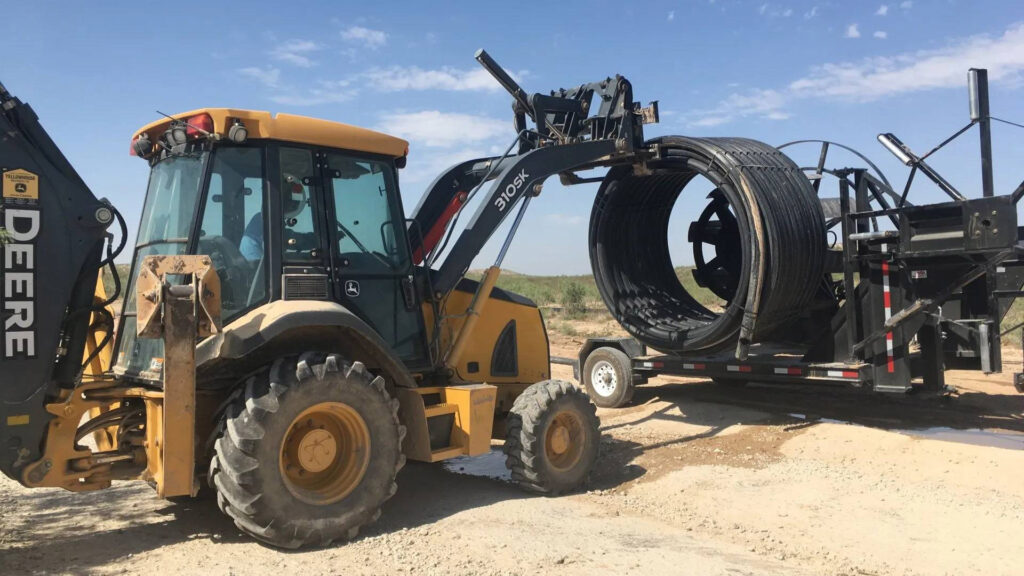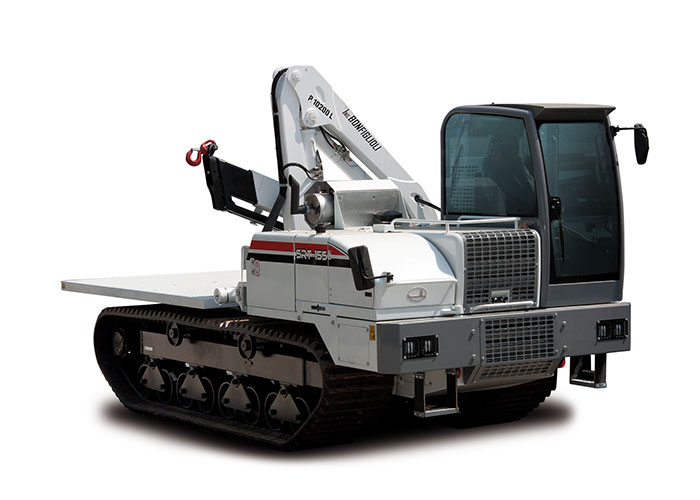A Comprehensive Overview to the Various Types of Oil Field Equipment and Pipeline Equipment Available
The oil and gas market counts heavily on specific tools for efficient extraction and transport. Numerous sorts of machinery, from piercing rigs to tank, play important functions in this intricate process. Each tool offers distinctive features that contribute to overall operational success. Recognizing these components is vital for any person entailed in the sector. As the industry progresses, so as well do the modern technologies that support it. What improvements are on the horizon?

Drilling Rigs: The Foundation of Oil Exploration
Drilling rigs act as the necessary equipment in the domain name of oil exploration, making it possible for firms to accessibility hydrocarbon reserves hidden deep below the Earth's surface area. These rigs are available in various types, consisting of land rigs, offshore rigs, and mobile devices, each created to operate in certain environments. Outfitted with sophisticated technology, piercing rigs can penetrate geological developments with accuracy, guaranteeing reliable resource removal. The structural stability and operational abilities of these rigs are crucial, as they have to endure severe problems and significant stress. The option of a boring gear influences the general task price and timeline, making it an essential factor to consider for oil firms seeking to enhance their expedition initiatives and make best use of efficiency in their procedures.
Pumps: Crucial for Liquid Movement
In the oil extraction process, the function of pumps is considerable, facilitating the motion of liquids throughout numerous phases of manufacturing. Pumps are essential for carrying petroleum, water, and various other fluids from below ground tanks to the surface area and after that via pipes to refineries. They can be found in numerous kinds, consisting of centrifugal, favorable variation, and completely submersible pumps, each serving particular functions based on the fluid qualities and operational requirements. Centrifugal pumps are typically used for their efficiency in high-flow applications, while positive displacement pumps master managing viscous fluids. The choice of pump impacts total performance, functional security, and maintenance prices. Correct choice and maintenance of pumps are important for optimizing manufacturing and decreasing downtime in oil area operations.
Valves: Managing Flow and Pressure

Shutoffs play an essential duty in handling the circulation and pressure of liquids within oil fields and pipes. Different kinds of valves offer distinct applications, each created to fulfill certain functions essential for reliable procedure - Superior Oilfield Rentals Texas. Recognizing the qualities and uses these shutoffs is important for enhancing system efficiency and safety
Kinds of Valves
Necessary parts in oil area operations, shutoffs play a critical role in managing the circulation and stress of liquids within pipelines and equipment. Different sorts of shutoffs are made use of to meet the diverse requirements of oil and gas manufacturing. Typical kinds consist of gateway shutoffs, which give a straight-line flow and minimal pressure decrease; globe valves, understood for their strangling capacities; and round valves, acknowledged for their fast on/off control. Furthermore, check shutoffs stop heartburn, while butterfly shutoffs supply a light-weight remedy for managing circulation. Each valve type is developed with particular materials and configurations to endure the severe conditions typically discovered in oil fields, making certain integrity and performance in procedures. Recognizing these kinds is important for efficient system administration.
Valve Applications and Functions
While various sorts of valves serve distinct purposes, their key applications rotate around managing flow and pressure within oil and gas systems. Shutoffs such as entrance, globe, and ball shutoffs regulate liquid motion, making sure peak efficiency and safety. Gateway shutoffs are frequently utilized for on/off control, giving very little flow resistance. World shutoffs, on the other hand, deal specific flow regulation, making them ideal for throttling applications. Round valves are preferred for their fast procedure and tight sealing capabilities. In addition, stress alleviation shutoffs are essential for protecting against system overpressure, guarding devices integrity. On the whole, the proper choice and application of shutoffs improve functional effectiveness, ensuring the trusted transport of oil and gas via pipelines and handling centers.
Compressors: Enhancing Gas Transport
Compressors play a critical function in the reliable transport of gas, guaranteeing that it official statement relocates smoothly with pipes over long ranges. These gadgets raise the pressure of all-natural gas, permitting it to conquer rubbing and elevation modifications within the pipeline system. In addition, compressors help with the harmonizing of supply and demand, fitting variations in consumption and manufacturing prices. Various sorts of compressors are used in the industry, including centrifugal, reciprocating, and rotary screw compressors, each offering distinctive advantages based on the functional needs. Regular maintenance of these compressors is necessary to make best use of efficiency and decrease downtime, ultimately adding to a trustworthy gas transport network. Their critical function highlights the value of compressors in the total oil and gas framework.
Storage Tanks: Safe and Efficient Fluid Management
Efficient transport of gas relies on different supporting systems, among which is the appropriate monitoring of tank. These containers play a vital duty in securely consisting of fluids, guaranteeing that functional effectiveness is preserved while minimizing environmental risks. Constructed from durable products, they are made to withstand high stress and harsh components. Appropriately sized and tactically situated, tank assist in the smooth flow of gas and various other liquids, stopping bottlenecks in supply chains. Regular upkeep and surveillance are essential to spot leaks or architectural problems, promoting safety and conformity with regulative standards. Ultimately, the reliable administration of storage space containers is critical for the total stability and reliability of the oil and gas sector's fluid handling systems.
Pipeline Systems: Framework for Transportation
Pipeline systems function as the foundation of the oil and gas sector, assisting in you can try here the efficient transport of hydrocarbons over huge distances. These systems include numerous components, including pipelines, valves, pumps, and compressors, all carefully created to guarantee smooth flow. The products used in pipeline building, frequently steel or high-density polyethylene, are picked for toughness and resistance to corrosion. Pipeline networks can extend across land and water, linking production sites to refineries and circulation centers. Furthermore, progressed technology allows real-time surveillance of flow prices and stress levels, improving operational effectiveness. The critical placement of these pipelines lessens ecological impact while making the most of source access, thus playing a vital duty in conference power demands internationally.
Security Equipment: Making Sure Employee and Environmental Management
The operation of pipeline systems, while essential for energy transportation, likewise offers substantial safety challenges for workers and the atmosphere. Security tools plays a substantial role in mitigating these risks. Personal protective equipment (PPE) such as safety helmets, gloves, and non-slip shoes safeguards employees from physical threats. In addition, gas discovery systems check for leakages, ensuring that hazardous substances do not position a risk to personnel or the surrounding community. Emergency shutdown systems are crucial for swiftly halting operations during a crisis, protecting against possible calamities. Spill control materials, including absorbents and obstacles, are fundamental for reducing environmental influence. On the whole, buying comprehensive security devices is important for maintaining functional stability and safeguarding both workers and the setting in the oil and gas field.

Regularly Asked Questions
Exactly how Do I Pick the Right Oil Field Equipment for My Project?
Selecting the appropriate oil field equipment includes assessing task specifications, budget restrictions, and functional needs. Consider elements such as tools integrity, compatibility with existing systems, and the supplier's online reputation to guarantee peak performance and security.
What Are the Upkeep Needs for Oil Field Equipment?
Upkeep needs for oil area equipment include regular evaluations, lubrication, and timely repair services. Operators needs click for source to also adhere to maker standards, screen efficiency metrics, and assurance compliance with security guidelines to enhance longevity and efficiency.

Exactly How Can I Ensure Conformity With Environmental Regulations?
To assure compliance with ecological policies, firms should perform routine audits, apply finest practices, spend in training, maintain correct documentation, and remain upgraded on regulations (Superior rentals squeeze tools). Partnership with ecological agencies can likewise boost adherence to regulations
What Is the Typical Life-span of Pipeline Equipment?
The average life expectancy of pipeline tools generally varies from 20 to half a century, depending on elements such as worldly top quality, environmental conditions, and maintenance techniques. Regular evaluations can substantially affect longevity and operational effectiveness.
Exactly how Do I Securely Move Oil Field Equipment to Remote Locations?
Transferring oil area devices to remote areas calls for mindful planning, including path evaluation, protecting authorizations, making use of ideal vehicles, and guaranteeing safety procedures are complied with. Appropriate training and communication among teams are crucial for effective transport.